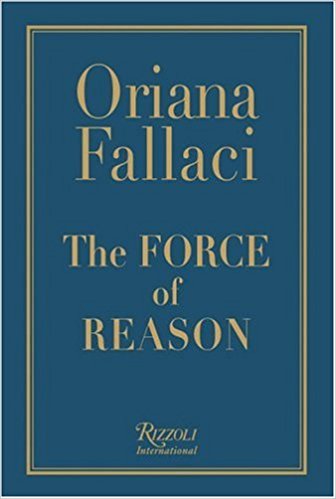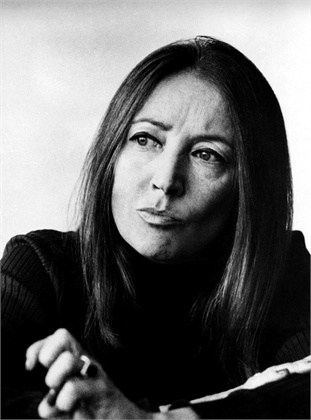Are Cassandras Fated Only to Talk to the Wind?
Jon Harrison Sims, American Renaissance, November 2007
Oriana Fallaci, The Force of Reason, Rizzoli, 2004 (English translation, 2006), 307 pp.
The late Oriana Fallaci (1929-2006) cannot be accused of racism or fascism. As a teenager, she fought in the resistance in her native Italy, and for most of her life, she considered herself to be part of the European Left. Nor can she be accused of not knowing her last and most important subject: Islam.

Fallaci was an independent-minded and courageous journalist, and also well-read in the history and literature of her fatherland, which for her was more than Italy; it was all of Europe. As a foreign correspondent, she reported from Vietnam and Cambodia in the 1960s, and from Mexico City in 1968, when government troops fired on student demonstrators in Tletololco Square, killing and wounding hundreds. Fallaci herself was hit with three rounds, dragged down a flight of stairs and left for dead by Mexican soldiers. She recovered and resumed reporting. In 1971, she was in Bangladesh, covering the Indo-Pakistani War. In 1982, she was in Beirut, for the fighting between the Lebanese government and the Palestinian Liberation Organization.
She became most famous, however, for her interviews with world leaders, including such figures as Haile Selassie, Yassir Arafat, Zulfikar Ali Bhutto, the Shah of Iran, Nguyen Cao Ky, Indira Gandhi, Ayatollah Khomeini, and Muammar Gaddafi. She asked tough, persistent questions, and her subjects rarely agreed to a second round. Henry Kissinger described his interview with her as the most disastrous conversation he ever had with a member of the press. Khomeini was an exception. The second time she interviewed him was in October 1979 in the holy citadel of Qom, right after the Islamic Revolution and Khomeini’s triumphant return.
Later in life, she turned to writing novels, and exiled herself because of disgust with what was happening to her Tuscan homeland, in particular, the Muslim inundation of her native city of Florence. In 2001, she was living in New York City when terrorists brought down the twin towers. This prompted her to write, in a fervor of white heat, The Rage and the Pride (2002). It was not that the attacks changed her opinions, it was that they so enraged her that she was ready to write in defiance of what she called “the New Inquisition:” the system of social and legal repression used to enforce public adherence to multicultural orthodoxy. The book went off like a bomb. Leftists howled and Muslims called for her assassination. But real Europeans read it, and it became a best seller in Italy, France, and Germany. Two years later came The Force of Reason, a better book, more closely reasoned, more historical, more heroic, an instant classic. Its message: Wake up sons of the West! She writes:
I don’t like to say that Troy is burning. That Europe is by now a province of Islam or rather a colony of Islam and Italy an outpost of that province, a stronghold of that colony. Saying this amounts to admitting that the Cassandras really do talk to the wind, that in spite of their screams of pain the blind remain blind, the deaf remain deaf, consciences reawoken soon relapse into sleep, and the Mastros Ceccos [a medieval scholar burned by the Inquisition for heresy] die for nothing. But the truth is just this. From the Strait of Gibraltar to the fjords of Soroy, from the cliffs of Dover to the beaches of Lampedusa, from the steppes of Volgograd to the valleys of the Loire and the hills of Tuscany, the fire is spreading. In each one of our cities there is a second city . . . a State within the State. A government within the government. A Muslim city, a city ruled by the Koran.

Oriana Fallaci
After reviewing nearly a thousand years of Muslim aggression against the Christian West (Saracens invading Spain and France, Ottomans besieging Constantinople and Vienna) and defending the Crusades (a “counter-offensive designed to stem Islamic expansionism in Europe”), she arrived at the most dangerous period of all — now:
“Today’s Islamic invasion of Europe is nothing else than a revival of its centuries-old expansionism, of its centuries-old imperialism, of its centuries-old colonialism. More underhand though. More treacherous.”
Why more treacherous? Because this invasion is waged not by marauding cavalry but by terrorism, immigration, and fertility, and it is the last two that she finds most dangerous. Unlike a terrorist bomb or an invading army, they do not provoke a reaction. They work slowly, imperceptibly, without violence, their consequences unforeseen or ignored by all but a few. But over time, these weapons are more effective than conquering soldiers:
“The strategy of exporting human beings and having them breed in abundance is the simplest way to take possession of a territory. To dominate a country, to replace a population or to subjugate it.”
Europe, not America, is the prize. “Islamic colonialism has always tried to subjugate Europe because, besides being rich and full of water, Europe is the cradle of Christianity.” It is also closer than America.
Fallaci’s research demonstrates there is a long-range plan. She admits she was unaware of it when she was at the height of her prestige as a correspondent. George Habash of the Popular Front for the Liberation of Palestine boasted during an interview in Beirut in 1972:
Our revolution is part of the world revolution. It is not confined to the reconquest of Palestine. . . . The entire Arab Nation must go to war against Europe and America. It must unleash a war against the West. And it will. America and Europe don’t know that we Arabs are just at the beginning of the beginning. That the best has yet to come. That from now on there will be no peace for the West. To advance step by step. Millimetre by millimetre. Year after year. Decade after decade. Determined, stubborn, patient. This is our strategy.
At the time, Fallaci thought he was talking about terrorism. Only later did she understand: “He meant the cultural war, the demographic war, the religious war waged by stealing a country from its citizens . . . . the war waged through immigration, fertility, presumed pluriculturalism.”
She reminded readers of the words of Houari Boumedienne, president of Algeria, speaking before the United Nations in 1974: “One day millions of men will leave the southern hemisphere of this planet to burst into the northern one. But not as friends. Because they will burst in to conquer, and they will conquer by populating it with their children. Victory will come to us from the wombs of our women.” That year, the Islamic Conference, meeting in Lahore, Pakistan, resolved to push Islamic immigration into Europe and take control of the Continent through a strategy of “demographic preponderance.”
In 1974, Italian Minister of Defense Giulio Andreotti told her about a conversation between King Faisal of Saudi Arabia and the president of Italy just a few months before the Arab oil embargo of October 1973. The king told Giovanni Leone that he wanted to see a grand mosque built in Rome. Surely the president said no, Fallaci replied. Andreotti only sighed. Construction began in 1984 and the mosque was finished in 1995. Today, there are grand mosques in every major European capital.
Europe’s leaders betrayed their people. Fallaci writes that they did so out of fear of Islamic terrorism and the oil weapon. They did so because of the European Left, which Fallaci believed governs Europe with the collusion of a bogus Right, and is defined not by socialism or liberalism, but by anti-Westernism. They did so openly in a series of government conferences, beginning in November 1973, immediately after the embargo. The Paris Conference of July 1974 established the Parliamentary Association for Euro-Arab Cooperation, based in Strasbourg. The next year it founded the journal, Eurabia, in the back issues of which are the terms of the bargain: a “long term policy” of transferring European technology to the Middle East in exchange for “crude oil and Arab manpower reserves.”
In June 1975, 200 parliamentarians from European countries met in Strasbourg and unanimously adopted the Strasbourg Resolution. It called on governments “to safeguard the free movement of Arab workers who will immigrate to Europe,” to protect “their fundamental rights [which] must be and will be equivalent to those of national citizens,” to “use the press and the various information outlets to create a climate favorable to the immigrants and to their families” and to “exalt through the press and the academic world the immense contribution given by Arab culture to European development.”
Thirty years later, there are 40 million Muslims living in the European Union, 15 million of them illegally. Deportations are rare. France alone has 10 million Muslims and nearly 3,000 mosques (Fallaci’s estimate was higher than the official one). She saw the threat as relentless:
Everywhere, even in Iceland, they are visibly increasing. And not only because the invasion is proceeding relentlessly but because the Muslims stand as the most prolific ethnic and religious group in the world. A characteristic favored by polygamy and the fact that in a woman the Koran sees only a womb for giving birth.
Because of the influx of refugees and asylees (“the new tools of the invasion”), human smuggling, the reluctance to deport, and, above all, fecundity, the Muslim population of Europe is expected to double by 2016 and become a majority by 2100. Fallaci quoted Bassam Tibi, a Muslim leader in Germany: “The problem is not to establish whether within 2100 the greatest majority or the totality of Europeans will be Muslim: one way or another, they will. The problem is whether the Islam destined to dominate Europe will be an Euro-Islam or the Islam of Sharia.”
Fallaci also quoted a Muslim scholar who shocked the assembled prelates at a 1999 Vatican synod on Christian/Moslem relations by saying, “By means of your democracy we shall invade you, by means of our religion we shall dominate you.” “Which is why,” wrote Fallaci, “I don’t believe in the Dialogue with Islam.” Nor did she believe in “moderate” Islam. “There is Islam and that’s all. And Islam is the Koran. And the Koran is the Mein Kampf of a religion which has always aimed to eliminate the others.”
Islam has two faces. The terrorists try “to break our spirit,” “to intimidate us, to discourage us, to blackmail us,” while the moderates colonize and out-breed us. Do not the Saudis, our “allies,” fund mosques and madrassas in Europe and America? Are not wealthy sheiks and emirs buying up land in Spain? Do not mullahs urge Muslim women to bear at least five children?
Fallaci understood that the United States faced a similar threat of invasion from the south. She never forgot her experiences at the hands of the Mexican authorities. The June 2, 2006, New Yorker reported that late in life, living in the United States, the mass demonstrations by illegal immigrants waving Mexican flags “disgust[ed]” her. “If you hold a gun and say ‘Choose who is worse between the Muslims and the Mexicans,’” she said, “I have a moment of hesitation. Then I choose the Muslims . . .”
Fallaci’s message was for us as well. Sons and daughters of the West, awake!















